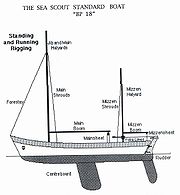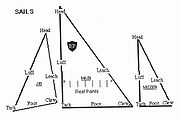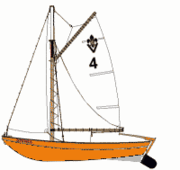.gif)
Sea Scouts (Scouting Ireland)
Encyclopedia
Sea Scouting has existed in Ireland since 1912. Currently, all Sea Scout Groups in Ireland are members of the World Organisation of the Scout Movement (WOSM) through Scouting Ireland
. Sea Scout
ing provides Scout training with and through water-borne activities.



 During 1976 a questionnaire was sent to all Sea Scout Leaders throughout the country asking for their ideas about a Standard boat for Sea Scout use. At that time the nearest there was to a standard rowing craft was the East Coast Skiff. This was however confined to the east coast, and was considered by some to be unsuitable for their needs and comparatively expensive for a craft which could not be used for sailing also. The “Mirror” dinghy was used in some Groups for sailing instruction. The general feeling throughout the section was that we needed a boat about 18 to 20 feet long, which could carry about 5 or 6 Scouts and could be rowed or sailed. Information about other Sea Scout boats was obtained – the New Zealand Standard Boat, the British “Home Counties Gig” and the Dutch “Lelievlet”. Mr. Kevin MacLaverty, a marine architect, expressed interest in our project, and all the information that had been collected was handed over to him for study and opinion. The result was a set of plans and a model of a proposed new Irish Standard Sea Scout Boat which were presented to the Sea Scout Leaders’ Conference in Cobh in 1977. The design was for a “double-ender”, 18 feet over all, capable of being rowed with 2, 4 or 6 oars, and rigged for sail as a ketch. The conference adopted the design, and a committee was established to pursue the matter further, particularly to seek sponsorship for making the mould. This sponsorship was eventually provided by the British Petroleum Company, and therefore the class was named “BP 18”. The standard sailing rig is a Bermudan Ketch, with the jib and mainsail being the same size as those of a G.P.14.
During 1976 a questionnaire was sent to all Sea Scout Leaders throughout the country asking for their ideas about a Standard boat for Sea Scout use. At that time the nearest there was to a standard rowing craft was the East Coast Skiff. This was however confined to the east coast, and was considered by some to be unsuitable for their needs and comparatively expensive for a craft which could not be used for sailing also. The “Mirror” dinghy was used in some Groups for sailing instruction. The general feeling throughout the section was that we needed a boat about 18 to 20 feet long, which could carry about 5 or 6 Scouts and could be rowed or sailed. Information about other Sea Scout boats was obtained – the New Zealand Standard Boat, the British “Home Counties Gig” and the Dutch “Lelievlet”. Mr. Kevin MacLaverty, a marine architect, expressed interest in our project, and all the information that had been collected was handed over to him for study and opinion. The result was a set of plans and a model of a proposed new Irish Standard Sea Scout Boat which were presented to the Sea Scout Leaders’ Conference in Cobh in 1977. The design was for a “double-ender”, 18 feet over all, capable of being rowed with 2, 4 or 6 oars, and rigged for sail as a ketch. The conference adopted the design, and a committee was established to pursue the matter further, particularly to seek sponsorship for making the mould. This sponsorship was eventually provided by the British Petroleum Company, and therefore the class was named “BP 18”. The standard sailing rig is a Bermudan Ketch, with the jib and mainsail being the same size as those of a G.P.14.
Details and Specifications
 The Lelievlet
The Lelievlet
is the most commonly used steel sailing and rowing boat of the Sea Scouts of Scouting Nederland
, it is also used by the National Water Activities Centre(NWAC) in Killaloe, Ireland. Its design is based upon the beenhakkervlet and its name is derived from the international scout logo, the French lily.
Details and specifications
From an activity perspective the scouts have Adventure Skills badges. There are 9 skills, Sailing, Rowing, Paddling, Emergencies, Camping, Pioneering, Backwoods, Hillwalking and Air with 9 levels within each of these skills. Other skills can be pursued with Special Purpose Awards which allow the Sea Scout to incorporate activities like snorkeling, power-boating and pretty much any activity that the individual scout wishes to follow.
Further to these skills there is a Nautical Training Scheme which allows for the maritime ethos essential to a progressive nautical symbolic framework to be successfully implemented. This training scheme is open to all members of Scouting Ireland wishing to further their maritime knowledge. The badges are progressive and lay out the steps that the young person will take on their journey through the nautical symbolic framework.
There is also a Chief Scouts Award for each section. At the Scout, Venture Scout and Rover Scout Sections these are linked to the Bronze, Silver and Gold An Gaisce – The President's Awards.
Scouting Ireland
Scouting Ireland is the World Organization of the Scout Movement-recognised Scouting association in the Republic of Ireland, although it also has Scout Groups in Northern Ireland. Scouting Ireland is a voluntary, non-formal educational movement for young people...
. Sea Scout
Sea Scout
Sea Scouts are members of the international Scouting movement, with a particular emphasis on water-based activities, such as kayaking, canoeing, sailing, and rowing. Depending on the country and the available water these activities are on lakes, rivers or sea in small or large ships. Sea Scouting...
ing provides Scout training with and through water-borne activities.
History

The Sea Scout Standard Boat (BP18)



Details and Specifications
- LOA: 18’ 1.5” (5.52 m)
- LWL: 15’ 0” (4.57 m)
- BEAM: 6’ 2” (1.88 m)
- DRAFT: 1’ 2” (0.35 m)
- HULL: Moulded GRP with timber topstrake, keel and bilge
- RIG: Bermudan Ketch.
- SAIL AREA: 1200 sq.ft (111.5 sq.m)
The Lelievlet

Lelievlet
The Lelievlet is the most commonly used steel sailing and rowing boat of the Sea Scouts of Scouting Nederland, it is also used by many Sea Scouts in Flanders and the National Water Activities Centre of Scouting Ireland in Killaloe, Ireland...
is the most commonly used steel sailing and rowing boat of the Sea Scouts of Scouting Nederland
Scouting Nederland
Scouting Nederland is the national Scout organisation of the Netherlands with approximately 110,000 members Scouting Nederland is the national Scout organisation of the Netherlands with approximately 110,000 members Scouting Nederland is the national Scout organisation of the Netherlands with...
, it is also used by the National Water Activities Centre(NWAC) in Killaloe, Ireland. Its design is based upon the beenhakkervlet and its name is derived from the international scout logo, the French lily.
Details and specifications
- Height: 5.60 m
- Width: 1.80 m
- Height: 6.50 m
- Avg. Weight: 650 kg
- Sail: 12.15 m^2
Scouting Ireland Sea Scout Programme
Since the launch of the one programme Sea Scouts follow the same scheme as the rest of Scouting Ireland with a focus on water activities. The scout section follow the spirit of Adventure with Tom Crean the famous Irish seaman and Antarctic explorer.From an activity perspective the scouts have Adventure Skills badges. There are 9 skills, Sailing, Rowing, Paddling, Emergencies, Camping, Pioneering, Backwoods, Hillwalking and Air with 9 levels within each of these skills. Other skills can be pursued with Special Purpose Awards which allow the Sea Scout to incorporate activities like snorkeling, power-boating and pretty much any activity that the individual scout wishes to follow.
Further to these skills there is a Nautical Training Scheme which allows for the maritime ethos essential to a progressive nautical symbolic framework to be successfully implemented. This training scheme is open to all members of Scouting Ireland wishing to further their maritime knowledge. The badges are progressive and lay out the steps that the young person will take on their journey through the nautical symbolic framework.
There is also a Chief Scouts Award for each section. At the Scout, Venture Scout and Rover Scout Sections these are linked to the Bronze, Silver and Gold An Gaisce – The President's Awards.

